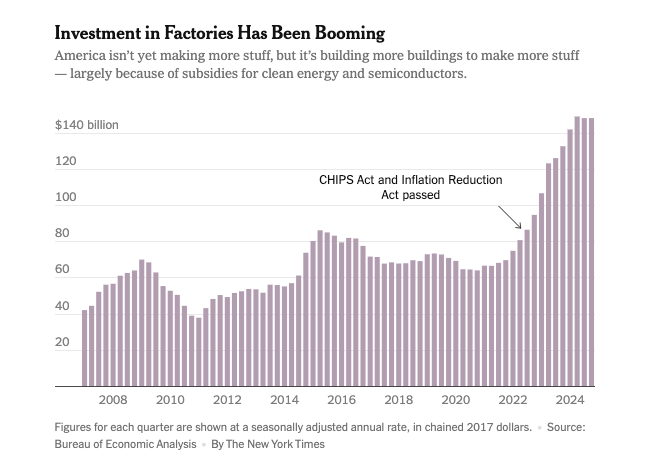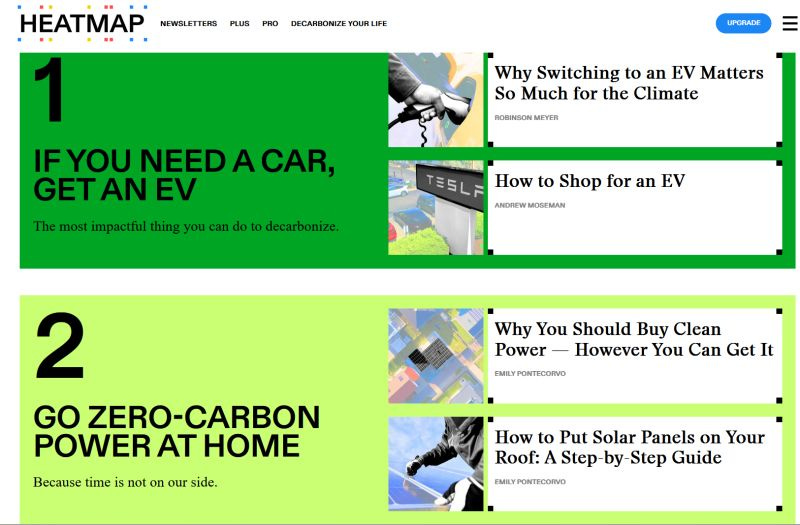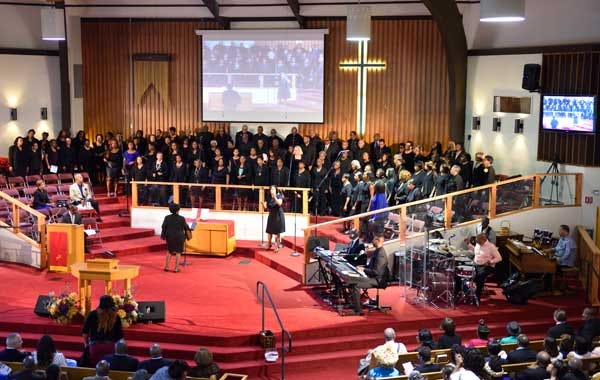Refugia Newsletter #87
Renewable energy in Africa, mitigating threats to the US clean energy manufacturing boom, defending science, Black church resilience hubs, a little snark, and a humpback whale calf
Refugia News
Resolute. That is my word right now. I have it pasted to my computer screen on a sticky note. Remain resolute. I’m trying. I hope you are, too.
I want to welcome the many new subscribers I am noticing this week. Hello! It seems you are coming here from other Substack recommendations, so welcome to this little community, where we seek to draw from the resources of faith in order to find, nurture, and create healing “refugia” spaces in the earth and in our cultural and spiritual lives.
As a biological concept, “refugia” are places in nature that survive and even grow amid severe “disturbance.” Well, here we are amid severe disturbances of numerous kinds. Our work has gotten much harder in the past few weeks. We are facing a reckless assault at the federal level right now on anything having to do with science, clean energy transition, climate justice, and conservation. The massive firings, withheld funds, and DOGE wrecking ball projects are illegal and unconstitutional. Not to mention vicious, foolish, and rife with lies.
Is a sticky note not inspiring enough? Maybe I should embroider the word “resolute” on some cotton cloth and embellish with little flowers? I’ve taken up embroidery recently as a coping tool: it’s therapeutic to stab something with a needle thousands of times.
We have to stick together and keep fighting for the better world we envision, based on the inspiration of our faith traditions. I take some heart from the many voices uniting now to tell the truth and keep alive the goal of a firmly democratic, equitable, sustainable America. This essay by Robert Reich, “Ten Reasons for Modest Optimism,” is worth a read to strengthen you for the day.
Below I’ll share some action items for you. I haven’t done that very much in the past in this newsletter—I try to stick with reporting and sharing—but if you are feeling anything like I am right now, taking action is essential for walking forward in hope.
This week, among my own hope-filled actions, I did a little interview for the Michigan Climate Action Network. I just gave a brief testimony of sorts about the process of getting a heat pump for my home, and how great it has been, how much we’re saving in energy costs, how much nicer it is than a furnace and air conditioner. MiCAN is doing a video series on neighbor-to-neighbor storytelling to help people understand that climate solutions aren’t scary—they’re great!
This weekend, husband Ron and I are headed “up north” to Traverse City, Michigan, to interview the good folks at Traverse City Presbyterian Church about all their climate action work. Our interviews will become an episode in the next season of the Refugia Podcast. I’ll report on our visit for you next time.
This Week in Climate News
Let’s start with good news from elsewhere in the world. Conventional wisdom used to hold that, in order to bring poor people in developing countries out of poverty, you need fossil fuels to create economic growth. This argument lingers among fossil-fuel advocates, but it’s no longer true. Instead, the safest and cheapest way to improve living standards now is through renewable energy. This is a phenomenon called “decoupling”—i.e., decoupling fossil fuels from economic growth. As a result of decoupling, in many regions, people who have never had reliable electricity are now aiming to “leapfrog” right over fossil fuels to renewable energy.
For example, Mission 300, led by the World Bank Group, African Development Bank, and other partners, has developed
an ambitious initiative to connect 300 million people to electricity in Sub-Saharan Africa by 2030. Mission 300 aims to accelerate the pace of electrification in Sub-Saharan Africa while ensuring that the transition to more diversified and cleaner sources of energy meets growing demand, brings economic growth, and creates jobs. Efforts are also focused on investing in generation, transmission, distribution, regional interconnection, and sector reform to ensure quality, reliability, and affordability of power supply.
One nifty program among many under the heading of Mission 300: training women in Nigeria as renewable energy engineers. This short video explains:
All right. Back to the US. How can we keep the clean energy revolution going in the US, despite… everything. Elizabeth Kolbert’s piece in The Atlantic nicely sums up what’s at stake. And this article by Lydia DePillis in The New York Times (free link) examines the challenges to businesses and investors—and all the communities set to benefit from a clean energy economy—from the Trump regime’s attempts to withhold funding and support.
President Biden’s policies, through the IRA, the Bipartisan Infrastructure Act, and the CHIPS act, were starting to create a manufacturing boom in the US. Here’s how DePillis explains:
The Biden administration’s strategy relied on a push and a pull. First, push the supply of clean energy products through tax breaks, loans and direct grants to manufacturers. Equally important was pulling demand along: rebates for buying electric cars, tax credits for producing renewable power, and subsidies for states and individuals to install solar arrays. Companies contemplating manufacturing investments took both sides into account when planning where to build or expand a plant.
The result has been billions of dollars in investments in new manufacturing and supply chain, poising the US to be competitive globally in a rapidly accelerating global green economy that includes batteries, solar, wind, EVs, and more. Putting the brakes on this is just… stupid, but that is what the Trump regime is trying to do. This creates uncertainty and hesitation among investors and business owners—not least the US auto industry. So will the US’s manufacturing revolution stall?
DePillis ends the piece on a somewhat optimistic note:
Jigar Shah, who ran the Loan Programs Office at the Energy Department under the Biden administration, puts an optimistic spin on the state of the industry. He estimates that more than half the new manufacturing facilities that his office supported are under construction, and that most of their executives remain confident in the business case for completion, because the industry fundamentals even without subsidies remain strong.
What can you do to help? Right now, especially if you live in a red state, call your senators and representatives in Washington and tell them you are a person of faith and you want them to insist on keeping in place all IRA tax credits and other incentives. Republicans in Congress need to be told that their compliant behavior is unacceptable to their voters—on many issues, but here I’m talking about threats to IRA funding, which directly benefits red counties and states.
Heather Cox Richardson sums up what’s at stake for red states:
Since Trump took office just a month ago, cuts to government spending have also hit Republican voters hard, and those hits look to be continuing. In June 2024, Ella Nilsen and Renée Rigdon of CNN reported that nearly 78% of the announced investments from the Inflation Reduction Act in initiatives that address climate change went to Republican congressional districts. Today the Financial Times noted that House Republicans are in the position of cutting the law that brought more than $130 billion to their districts.
Want to be super informed before you make your calls? You can use this incredible tool developed by the folks at Grist. Plug in your zip code, and it will show you details about every project funded by the IRA the Bipartisan Infrastructure law near you.
I mean: wow.
And here’s my own region. Goodness.
Once you’ve called your federal reps, you can go back to work at the local level. Encourage your state reps to keep pushing for climate action in your state. Here’s a link to a Climate Action Now campaign that provides you with talking points and makes it easy to contact your state reps by phone or email.
Just for encouragement, look what just happened in Illinois. This article by Sarah Mattalian in Inside Climate News explains how an Illinois utility is stepping in to provide incentives for EV charging and “fleet conversion”:
On the same day the Trump administration announced it was freezing federal funds dedicated to electric vehicle projects, the largest electric utility in Illinois announced a $100 million rebate program to fund EV infrastructure projects in northern Illinois…
“ComEd is focused on ensuring that not only is the grid equipped for increased electrification, but that our customers and communities have the support needed to navigate the transition to EVs and the benefits they provide for customers as well as the environment,” said Melissa Washington, senior vice president of customer operations and strategic initiatives at ComEd.
Keeping incentives in place for EVs is critical to helping the auto industry follow through on the billions they have already invested in US EV manufacturing.
So, to sum up our action items:
Call your federal reps to demand that IRA funding remain fully in place.
Call your state and local reps and urge continued work toward clean energy transition and healthy clean energy economy at the state level.
Thank your reps, too, if they’re already doing good climate work. And give yourself a big pat on the back for doing your part as an active citizen.
Deeper Dive
Three opportunities today for a little deeper diving.
First, science. Are you worried about the attack on science and scientists at the federal level? Yeah, so am I, and obviously so are the nation’s scientists in every field.
Apparently, I now read The Bulletin of the Atomic Scientists, because I have two articles from this journal to share with you. The first, by Adam Sobel, provides a sharp summary of the Trump regime’s gutting of federal science agencies, and it further explains very clearly how federal money works in the sciences. Understanding this system is vital to fighting the insidious mis-information about “waste and fraud.” The article then considers the potential damage to US scientific leadership built over 80 years: “If everything the administration is pushing for materializes, we are likely to lose a generation of American scientists or more, depending how long this goes on.”
The second article, by Glenn Branch, is a little more encouraging. It explains that federal attacks on climate education in schools can be survived if states remain strong. The article gives a little overview of how states are doing in promoting science-based, realistic climate education.
Finally, here’s another article (not from the atomic scientists this time) on how scientists are saving data being hidden or deleted data from federal sites. Go, scientists!
Second deep dive: carbon capture. What on earth is carbon capture, and why does the fossil fuel industry love it? This article, from British group Global Witness, explains in helpful, basic terms. What they say here confirms what I’ve read in other reliable sources, including Genevieve Guenther’s important book, The Language of Climate Politics. Bottom line: fossil fuel companies are getting huge government subsidies for a technology that will not help us. It will not work at scale, nor in time. The math just doesn’t add up.
Finally, here’s a nifty new resource from HeatMap in partnership with Rewiring America aimed at helping you figure out how to “decarbonize your life.” The site features information and tips on EVs, heat pumps, solar, appliances, diet, community action, and more.
Here’s what they say about this simple, sharable, remarkably user-friendly resource:
This is our attempt, in other words, to assist you in living something like a normal life while also making progress in the fight against climate change. That means making smarter and more informed decisions about how climate change affects your life — and about how your life affects climate change.
The point is not what you shouldn’t do (although there is some of that). It’s about what you should do to exert the most leverage on the global economic system and, hopefully, nudge things toward decarbonization just a little bit faster.
Refugia Sighting
Black churches in the US have a long tradition of justice action, serving their communities, and offering prophetic witness. These days, I see more Black churches doing effective climate-justice-related work. So I loved seeing Allen Temple Baptist Church in Oakland, California featured on this 15-minute podcast episode from KQED, the NPR station in northern California. Allen Temple is a big church—they run a whole community center—and they are striving to become a “hub of resilience.”
Part of that initiative includes modeling climate solutions. They now have 270 solar panels on the church, along with a bank of batteries—so they are saving $20,000 per year in utility costs. Even more, they are modeling climate resilience for their community and as part of the Black church network.
Allen Temple is part of the Green the Church movement, the brainchild of Rev. Dr. Ambrose Carroll. Rev. Carroll understands that Black churches do not necessarily see themselves as “environmentalists”—that term is fraught with implications of privilege. However, they are often on the front lines of climate injustice, with all the resulting adverse health effects and socio-economic challenges. So Carroll founded the “premiere organization at the intersection of the Black faith community and environmental justice.”
Allen Temple worship. Image credit: allen-temple.org.
Allen Temple’s ambitions are not only about saving energy for their own operations, but about “seeding” these climate solutions among their congregants and community. They also strive to serve as a resource and haven during power outages, storms, fires, and other climate-related impacts.
Carroll wants to make 2000 resilience hubs among Black churches in the next few years. However, this ambition is premised on IRA funds designated through the Justice 40 mandate. What will happen now? Funds in this category are currently (illegally) frozen, despite a court order to unfreeze the freeze. All the more reason for all of us to push for continuing all IRA funding. Thriving and just communities depend on it.
The Wayback Machine
In April of 2023, I wrote a review of the AppleTV series Extrapolations, a creative collaboration that explores through fictional stories what the world will be like in future decades if we don’t do enough to address climate change now. It’s a grim watch, so I haven’t gone back to it… until this week. This week, I re-watched episode 1. Yeesh. It was so prophetic. Here’s what I wrote about episode 1 in 2023:
In this portrait of 2037—against the backdrop of 20 million acres burning in wildfires, severe water shortages, massive and desperate youth protests—we are confronted with the cynicism and greed of a few power brokers. In this world, protests and international negotiations are ultimately impotent when placed against the power of those determined to make as much money as possible on the way down. Apocalypse, after all, can be good for business.
Fortunately, the writers give us one moment of sweet revenge in this episode, perpetrated by, of all things, a mama walrus. There’s that cheekiness I mentioned. Silly, but satisfying.
If you have AppleTV, I do recommend giving Extrapolations a try. I’m curious to know what you think.
In the not-so-wayback department, I wrote this little piece of snark last week. Oh wait, no, actually it was written by my pal Pious Petunia. Miss Petunia turns up now and then to say her piece, and I always feel better when she does. She’s a bit of a fan favorite on The Reformed Journal blog where I’m a regular writer. This past week, Miss P had some things to say about what’s going on in the US right now. I find her parable especially clarifying.
Last but not least, just for sheer joy, I pass along from Bluesky this video of a humpback whale mama and her calf. (Note: you can find me on Bluesky at debrakrienstra.bsky.social.)
That’s plenty for this week. Thanks for reading. Take care of yourself, and till next time, be well.
Note: As always, bold type in quotations is added unless indicated.












Very grateful for the sticky-noted "Resolute" self-admonition. But in general, I loved the diversity of content and recommendations in this issue.